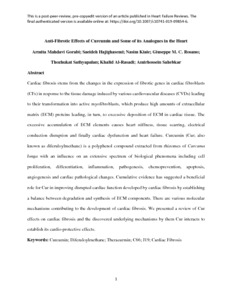Gorabi, AM; Hajighasemi, S; Kiaie, N; Rosano, GMC; Sathyapalan, T; Al-Rasadi, K; Sahebkar, A
(2020)
Anti-fibrotic effects of curcumin and some of its analogues in the heart.
Heart Fail Rev, 25 (5).
pp. 731-743.
ISSN 1573-7322
https://doi.org/10.1007/s10741-019-09854-6
SGUL Authors: Rosano, Giuseppe Massimo Claudio
![[img]](https://openaccess.sgul.ac.uk/113707/1.hassmallThumbnailVersion/Revised%20manuscript_heart%20failure%20reviews.pdf)  Preview |
|
PDF
Accepted Version
Available under License ["licenses_description_publisher" not defined].
Download (301kB)
| Preview
|
Abstract
Cardiac fibrosis stems from the changes in the expression of fibrotic genes in cardiac fibroblasts (CFs) in response to the tissue damage induced by various cardiovascular diseases (CVDs) leading to their transformation into active myofibroblasts, which produce high amounts of extracellular matrix (ECM) proteins leading, in turn, to excessive deposition of ECM in cardiac tissue. The excessive accumulation of ECM elements causes heart stiffness, tissue scarring, electrical conduction disruption and finally cardiac dysfunction and heart failure. Curcumin (Cur; also known as diferuloylmethane) is a polyphenol compound extracted from rhizomes of Curcuma longa with an influence on an extensive spectrum of biological phenomena including cell proliferation, differentiation, inflammation, pathogenesis, chemoprevention, apoptosis, angiogenesis and cardiac pathological changes. Cumulative evidence has suggested a beneficial role for Cur in improving disrupted cardiac function developed by cardiac fibrosis by establishing a balance between degradation and synthesis of ECM components. There are various molecular mechanisms contributing to the development of cardiac fibrosis. We presented a review of Cur effects on cardiac fibrosis and the discovered underlying mechanisms by them Cur interact to establish its cardio-protective effects.
| Item Type: |
Article
|
| Additional Information: |
This is a post-peer-review, pre-copyedit version of an article published in Heart Failure Reviews. The
final authenticated version is available online at: https://doi.org/10.1007/s10741-019-09854-6. |
| Keywords: |
C66, Cardiac fibrosis, Curcumin, Diferuloylmethane, J19, Anti-Inflammatory Agents, Non-Steroidal, Cell Differentiation, Curcumin, Fibrosis, Heart Failure, Humans, Myocardium, Myofibroblasts, Signal Transduction, Myocardium, Humans, Fibrosis, Curcumin, Anti-Inflammatory Agents, Non-Steroidal, Signal Transduction, Cell Differentiation, Heart Failure, Myofibroblasts, C66, Cardiac fibrosis, Curcumin, Diferuloylmethane, J19, Cardiovascular System & Hematology, 1102 Cardiorespiratory Medicine and Haematology |
| SGUL Research Institute / Research Centre: |
Academic Structure > Molecular and Clinical Sciences Research Institute (MCS) |
| Journal or Publication Title: |
Heart Fail Rev |
| ISSN: |
1573-7322 |
| Language: |
eng |
| Publisher License: |
Publisher's own licence |
| Projects: |
| Project ID | Funder | Funder ID |
|---|
| 943771 | National Institute for Medical Research Development | UNSPECIFIED |
|
| PubMed ID: |
31512150 |
| Dates: |
| Date |
Event |
| 2020-09 |
Published |
| 2019-09-11 |
Published Online |
| 2019-07-15 |
Accepted |
|
 |
Go to PubMed abstract |
| URI: |
https://openaccess.sgul.ac.uk/id/eprint/113707 |
| Publisher's version: |
https://doi.org/10.1007/s10741-019-09854-6 |
Statistics
Item downloaded times since 30 Sep 2021.
Actions (login required)
 |
Edit Item |



